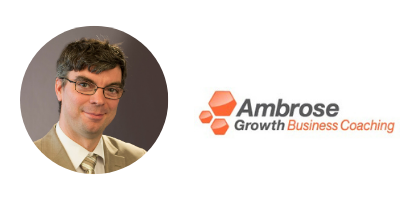- Membership
- The NY Chapter
- Our Career Services
- Committees
- National FACC Network
Meet the Member: Xavier Lederer, Founder & CEO, Ambrose Growth
Member news | October 26, 2020
Xavier Lederer, Founder & CEO of Ambrose Growth. Xavier helps CEOs and business owners of mid-market companies who are frustrated by the way their company is growing. As a business growth coach, Xavier's passion is to help them grow faster and with less pain, by helping them identify and then remove their growth roadblocks. 
FACC: What has driven you to help CEOs grow their companies for 20 years? What was your journey to becoming a Business Growth Coach?
For the past 20+ years I have been challenging the status quo to help companies grow, in the US and in Europe. Over time I started to realize that growing companies always stumble on the same, predictable growth roadblocks. I failed quite a few times on these roadblocks, until I started developing strategies to identify and remove them. I also realized that I absolutely love uncovering the intricacies of business situations and team dynamics to identity and fix root causes of companies’ growth issues. So I decided to focus on this specific aspect of the business lifecycle: I help companies that have grown successfully in the past and are starting to experience some rough patches in their growth – I help them get back on track to profitable growth.
FACC: How do you stay inspired around the idea of growth on a daily basis?
I love learning, and I learn a lot from my clients. They come with their dreams of growth, as well as their growth roadblocks, and together we have to find a path that will enable them to achieve their dreams. I find this intellectually stimulating. In every client engagement there are “aha” moments, when we have found a root cause of their growth roadblocks – these are key moments that can make a big difference for my clients. Searching for these “aha” moments is very motivating for me.
FACC: What are the main growth roadblocks that keep mid-sized companies from growing?
Every growing business runs into growth roadblocks. As it adds more employees and complexity, a business goes through several growth stages, and each requires a different management approach: you don’t manage a 5-people company like a 50- or a 500-people company. When a company outgrows its management approach, painful growth roadblocks appear, which prevent the company from growing – regardless of its growth potential. I often see four types of growth roadblocks:
- Lack of alignment of the leadership team. Misalignment happens when leaders are not on the same page in terms of visions, strategic goals, or priorities. Left unresolved, misalignment is the silent killer of growth. It is like children pulling on a rope. They maximize their strength if they all pull in the exact same direction. If someone pulls a little more to the left or to the right, the whole team is less strong. The same applies to businesses – except that misalignment is often invisible. When the team is small, getting alignment is very natural and easy. But as the team grows and there are more people around the table, aligning views becomes more complex. Often senior leaders don’t realize that they are not aligned. I like to ask senior leaders: “What are the strategic priorities that this company should focus on?” I ask them to write their answer individually. If the team is perfectly aligned all answers should tell the same story. If their answers tell more than one story, there is a problem.
- Poor execution: this happens when the leadership team has a plan, but not much is being implemented (or not on time). This is the result of a lack of systems to hold people accountable. A small company doesn’t need much system to hold people accountable: the founder is on top of everybody and can make sure that everything gets done. As the team grows this approach is physically not possible anymore, and things fall through the cracks – unless the team puts in place a system to hold people accountable and follow up on people’s commitments.
- Talent issues: the key question here is: “Would you enthusiastically rehire everybody on your team?” As a company grows its need for talents evolves. Some people can evolve as the company grows with proper training, but others can’t – or are not interested to. Growing companies that don’t regularly assess their talents, and help them develop new skills, stop growing at some point – not because of a lack of opportunities, but because it doesn’t have the right people in place.
- Lack of cash: Growth costs cash (e.g. to buy new equipment, fund payment terms for a growing clientele,…). Tight cash management, that involves the right people around the table (beyond the accounting team), is necessary to limit the need for outside funding – and provide much-needed cash to fuel your growth engine.
FACC: Is there a specific type of person in the professional world who is able to change compared to someone who cannot?
This is a very good question, because changing a company to unlock its growth potential very often involves changing the senior leaders’ behaviors (including the CEO/founder). These changes can be difficult; I sometimes hear CEOs make comments like: “Why should I change? I am not the problem; my team is the problem!” In order to be able to change a person needs to have a:
- Desire to change – ie a long-term goal that they highly value and that they passionately want to achieve. As you can imagine the senior leaders need to have the same long-term goal, and need the same strong desire to reach it.
- Willingness to change – ie the unwavering energy to keep implementing changes through the periods of doubt.
A leader who doesn’t have a strong desire and the unwavering willingness to change won’t be able to change their company, regardless how successful they have been in the past. However, once these two elements are in place, a lot becomes possible.
FACC: If an FACC-NY member who is frustrated by the way their business is growing had two minutes with you, what questions should they ask?
I would ask them 3 sets of questions:
- Where do you want to be in 5 years from now?
- What prevents you from getting there? Which roadblocks are in your way? If these roadblocks were eliminated, would you be able to reach your 5-year goal? If not: what else would prevent you from getting there?
- What are you not willing to do to get there?
FACC: What led you to joining the FACC-NY network?
Very simple: I wanted to expand my network of people who work across the Atlantic, and see how I can help. I was born and raised in Belgium and worked for 12 years in Europe, before moving to the US 10 years ago (first to California, then to Connecticut). I find the multicultural aspect of FACC extremely attractive.


